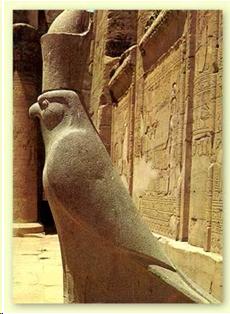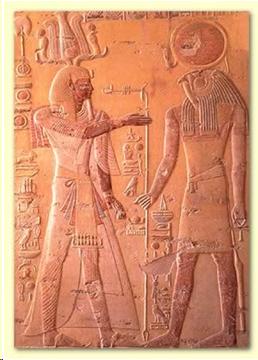Lecture Notes
As I mentioned previously, ancient Egyptians believed in many gods. In the earliest stages of Egyptian civilization, these gods were believed to have animal shape (the term for this is zoomorphism). As a consequence, Egyptian gods were often represented as animals - as falcons, vultures, a cobra, dog, cat or crocodile, for example. For the Egyptians, because animals were non-human, they must have possessed religious significance. As time passed, however, the Egyptian gods came to be understood differently; they became anthropomorphic. That is, these gods came to be believed to have human form, although they often retained the animal's head or body. Among the Egyptian pantheon a number of gods stand out as particularly important, because of their role in the creation of the world or due to their role in deciding man's life after death. The god Ra, to begion, was the god of the sun, as well as the creator god. He created the heavens and its hosts merely by thinking and giving names to things;as Ra uttered its name, the thing came into being. Ra also represented the power given to the pharaohs, who were originally thought divine and later were believed to be intermediaries between mankind and the heavens. Osiris was the Egyptian god who judged the dead. Osiris first emerged as a local deity of the Nile Delta in Lower Egypt. Osiris was believed to have been the god who introduced agriculture into Egypt and who taught Egyptians how to cultivate the land. Osiris was also important because he was believed to judge men after death, deciding their eternal fate. Isis was Osiris's wife. Where Osiris was identified with the life-giving, fertilizing power of the Nile, Isis was identified with the fertile earth of Egypt. Animal-headed Seth was Osiris's brother and rival. Jealous of Osiris's power, Seth killed Osiris. However, Isis persuaded the gods to bring Osiris back to life, after which time he came to rule the underworld. Horus, the god of the sky and son of Isis and Osiris, defeated the evil Seth after a long struggle. But Horus was only one kind of sky god. There was also Ra, the sun god whom I mentioned above, as well as the baboon-headed Thoth, who was the god of the moon, as well as the god of wisdom, magic and numbers. Despite the ever-increasing number of deities which could be added to this hierarchy of deities, one thing is certain: Egyptian religion, unlike the religion of Mesopotamia, was centralized. In Sumer, the temple was the focus of political, economic and religious organization. Indeed, it was often difficult to know where one aspect began and another ended. By contrast, the function of an Egyptian temple was focused on religion. One last thing to remember: Egyptians believed that the gods created the cosmos - they created order out of chaos. The Sumerians, as we've seen, had a similar belief. But the life of the Sumerian was filled with anxiety and pessimism because the gods themselves were unstable and the idea of an afterlife was unknown. In contrast, Egyptian religion inspired confidence and optimism in the external order and stability of the world, for the gods guided the rhythms of life and death.


